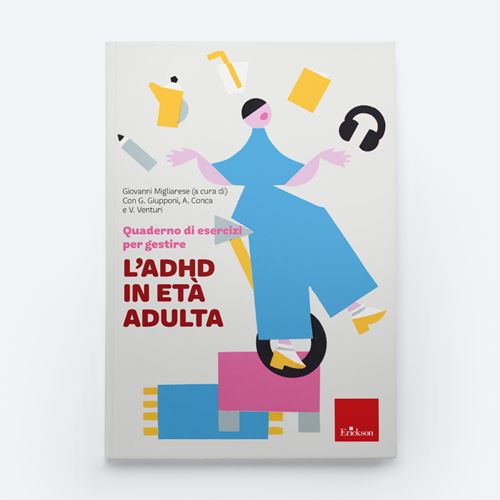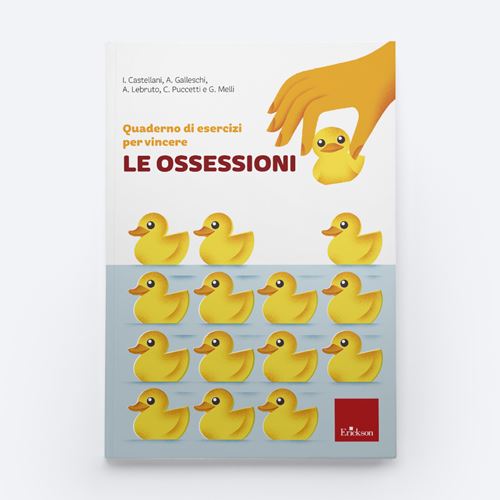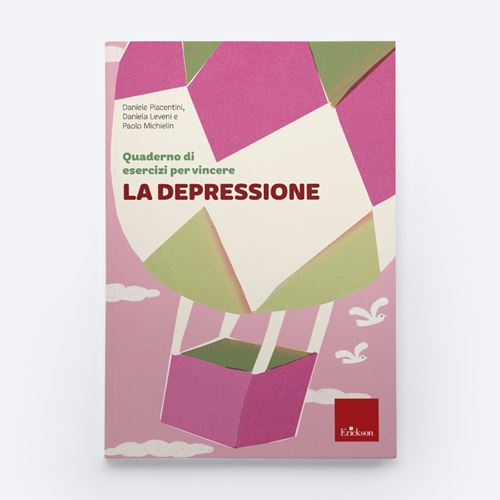 EN
EN
 PT
PT
Product: Book
Trim size in cm: 17x24cm
Pages: 184
ISBN: 9788859029731
Publication date: 01/09/2022
REQUEST A SAMPLE OR MORE INFORMATION
A useful workbook to help those suffering from Obsessive Compulsive Disorder to identify, understand and manage their symptoms in a conscious and functional way. It offers a 16-step self-help programme full of effective advice and numerous exercises designed to help readers recognize emotional beliefs and dysfunctional thoughts and work on the protective and avoidance behaviours that nourish “OCD”.
The goal of the book is to alleviate symptoms and the suffering associated with them, to learn to reduce self-criticism and to take care of oneself, in order to improve the quality of life.
Some of the proposed exercises can be downloaded and printed from the Online Resources by entering the activation code shown on the first page of the notebook.
Exercise books for self-help
A series of operational notebooks to address one’s psychological disorders through specific and structured exercises that allow you to independently implement strategies and techniques used in cognitive-behavioural therapy. The Notebooks can be used by those who do not want to or cannot face a therapeutic programme, but also by clinicians as practice for their patients.
Presentation
Introduction
FIRST SECTION - Define OCD
Chapter 1 - What is Obsessive Compulsive Disorder?
Chapter 2 - Your unpleasant emotions
Chapter 3 - Your avoidances and protective behaviours
Chapter 4 - Your dysfunctional thinking
SECOND SECTION - Exercises to conquer OCD
Step 1 - Identify obsessions and compulsions
Step 2 - Coping with unpleasant emotions and emotional beliefs
Step 3 - Identify avoidances and protective behaviours
Step 4 - Self-evaluate your OCD
Step 5 - Recognize dysfunctional thoughts
Step 6 - Describe the OCD
Step 7 - Reduce self-criticism
Step 8 - Distinguish normal obsessions and worries
Step 9 - Tolerate an excessive sense of responsibility
Step 10 - Increase risk tolerance and uncertainty
Step 11 - Learn to tolerate anxiety
Step 12 - Reassess emotional beliefs
Step 13 - Reduce problematic behaviours
Step 14 - Reinterpret the obsessions
Step 15 - Accept the obsessions
Step 16 - Preventing Relapses
Conclusions
Bibliography


Self-help exercise books is a new series of exercise workbooks designed to address personal psychological disorders through specific and structured exercises that allow you to independently implement strategies and techniques used in cognitive-behavioural therapy. The workbooks can be used by those who do not want to, or cannot, face a therapeutic program, but also by clinicians to provide exercises for their patients.
Each notebook of the series introduces the topic and explains the symptoms from a psychological point of view and suggests a programme of exercises and questionnaires to allow for self-intervention.
The topics of the workbooks:
STRUCTURE OF THE WORKBOOKS

Thanks to the use of charts, lists and a detailed insight box, the first section of the book synthetically and effectively describes the problem.

In the second section, an intervention programme is developed, divided into a series of steps and full of effective advice and numerous exercises.
THE VOLUMES

Suffering from Generalised Anxiety Disorder means living in a constant state of worry, which inevitably affects one’s quality of life and sense of personal fulfilment. It’s not just about feeling a little anxious. Everyday problems, no matter how small, can turn into overwhelming fears—whether it’s work, managing finances, family health, or the safety of one’s children.
This workbook offers an 11-step programme to help readers develop a healthier and more conscious approach to managing excessive worries and the resulting anxiety. It guides them in facing daily challenges with a more realistic, proactive, and functional mindset. The book is packed with advice, techniques, strategies, and exercises aimed at restoring well-being and fostering a calmer, more balanced life.
The workbook is divided into two parts:

Exercise workbook to overcome generalised anxiety
The 11 steps of the intervention programme:
Leaf through some pages of the book which have been translated into English to facilitate your evaluation of the product.

Attention Deficit Hyperactivity Disorder (ADHD) is a developmental self-regulation disorder that includes difficulties with attention and concentration, impulse control, and the different complexity of the activities. These issues essentially arise from the inability of children, adolescents, or adults to regulate their behaviour in relation to the passage of time, the goals to be achieved, and the demands of the environment.
The Exercise workbook for managing ADHD in adulthood presents a structured journey in 8 steps to help readers recognize the dysfunctional behaviours typical of ADHD and correct them through a series of strategies. This is a self-help book that enables readers to counter their weaknesses and transform them into strengths. The symptoms of Attention Deficit Hyperactivity Disorder that are diagnosed in childhood often persist into adulthood, causing difficulties in many important areas of an adult’s life: e.g. simply organizing time, regulating emotions and managing relationships become frustrating and insurmountable challenges.

Exercise workbook for managing ADHD in adulthood
The 8 steps of the intervention programme:
Leaf through some pages of the book which have been translated into English to facilitate your evaluation of the product.

Obsessive Compulsive Disorder (OCD) is a psychiatric disorder, which makes it a real disease. It is mainly characterized by the presence of obsessions, which can generate anxiety or other unpleasant emotions that generally lead those afflicted by it to put compulsions in place to alleviate these feelings.
The Exercise workbook for overcoming obsessions proposes a self-help programme in 16 steps to help those suffering from Obsessive-Compulsive Disorder to identify, understand and manage their symptoms in a conscious and functional way. The effective advice and numerous exercises will guide readers to describe their symptoms, recognize emotional beliefs and dysfunctional thoughts and work on the protective and avoidance behaviours that fuel “their OCD”. The goal is to relieve symptoms, and the suffering associated with them, learning to reduce self-criticism and take care of yourself, in order to improve your quality of life.

Exercise workbook for overcoming obsessions
The 16 steps of the intervention programme:
Leaf through some pages of the book which have been translated into English to facilitate your evaluation of the product.

The term “depression” has many meanings: it ranges from sadness and temporary despondency to more long-lasting, serious psychological conditions that cause great suffering. It is a disorder that not only affects moods and emotions, but also thoughts and behaviours. People suffering from depression experience great distress, despair and a sense of worthlessness, but thanks to the support of others and the use of effective treatments, it is possible to face and overcome it.
Exercise workbook for overcoming depression offers an 11-step self-help programme to help those who suffer from depression identify, understand and manage their depressive symptoms in a conscious and functional way. The volume is complete with exercises, questionnaires and activities inspired by international guidelines and the principles of cognitive-behavioural psychotherapy. The goal of this book is to reduce the symptoms associated with depression and improve the quality of life of people suffering from it.

Exercise workbook for overcoming depression
The 11 steps of the intervention programme:
Leaf through some pages of the book which have been translated into English to facilitate your evaluation of the product.

Social anxiety is a disabling disorder that generates suffering and causes significant limitations in everyday life. It is a frequently underestimated disorder that is interpreted as shyness. Furthermore, those who suffer from it often have difficulty asking for help from a professional, precisely because they are afraid of being judged. Therefore, they refuse to seek any type of support.
Exercise Workbook for Overcoming Social Anxiety offers a 10-step self-help programme for people who suffer from social anxiety, complete with exercises, questionnaires and activities to learn how to manage anxiety, live in a calm and balanced way and overcome the fear of being judged by others.

Exercise Workbook for Overcoming Social Anxiety
The 10 steps of the intervention programme:
Leaf through some pages of the book which have been translated into English to facilitate your evaluation of the product.